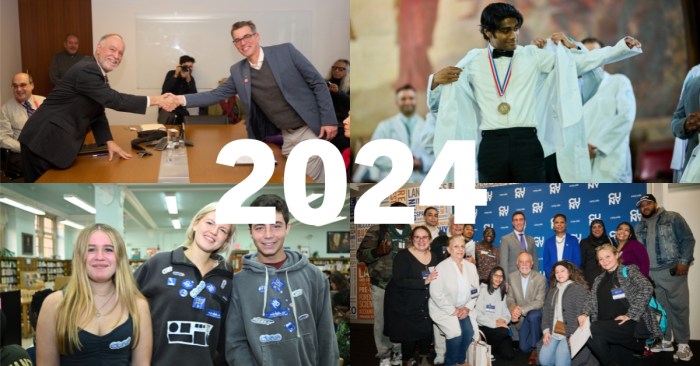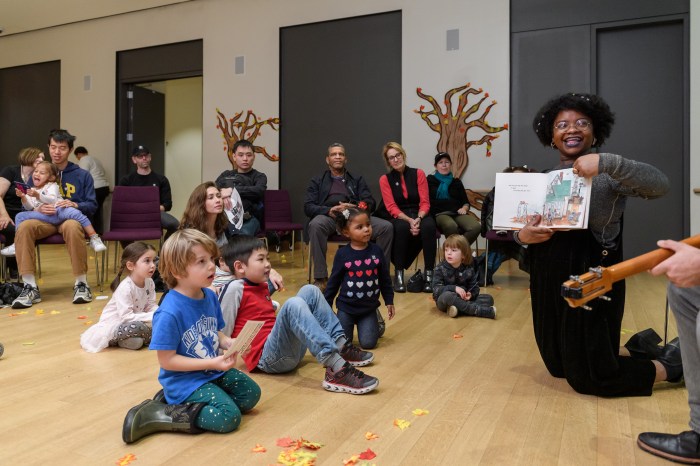Alexis Ramos enrolled at Borough of Manhattan Community College in 2016, earned her associate degree in theater three years later and graduated with a bachelor’s from City College this spring. Throughout Alexis’ years as a CUNY student, her son, Hunter, went to school, too — at the child care centers on both campuses. “Every day, I brought him to campus with me,” she says. “He’s been like another student at CUNY.”
Hunter was 1½ years old when his mom started community college; looking back, she says she sometimes doubted she’d ever make it to graduation. But at CUNY she found campuses that embrace students who are parents. Now, she’s a special kind of CUNY success story: She’s one of thousands of student-parents who have balanced the demands of classes, child-rearing and other obligations, persevering to graduation with the help of CUNY’s nationally recognized campus child care centers and other support the University provides.
This summer, that support includes over $3.1 million from the Chancellor’s Emergency Relief Fund that is paying the summer session tuition and fees of about 3,700 student-parents. The fund, which was established in the spring of 2020 to help CUNY students and their families weather the financial hardships caused by the pandemic, has disbursed almost $10 million to support over 17,500 students in need.
Culture of Support
The support this summer for student parents taking classes is a recognition of the financial pressures they face and the extraordinary effort that it takes for them to balance college with the responsibilities of raising their children, especially during the summer.
We know that when we help student parents stay on track, their children are also the beneficiaries. This is something I’ve learned through my longtime involvement with the Aspen Institute’s Postsecondary Success for Parents Initiative. With that in mind, we use Aspen’s carefully crafted two-generation (“2-gen”) approach, working with parents and their children together to promote a pattern of multigenerational success.
For decades, it has been a point of pride that we welcome and support our significant population of “nontraditional” students, adults typically in their late 20s and 30s who are either starting or returning to college after being in the workforce or the armed services. Many of them — more than 10 percent of our undergraduates — are students who are raising children.
That’s a lot of students who are juggling school with far greater demands. It’s why CUNY has long been at the forefront in providing high-quality, affordable child care to student-parents, many of whom could not stay in school without it. Today, we have centers on 17 campuses, all staffed by teachers certified in early-childhood education; together, they serve 1,600 children. Importantly, the centers stay open during the summer, providing additional support to parents during a time of the year that can be especially challenging.
And more centers are coming. Thanks to the leadership of Gov. Hochul, the 2023 New York State budget includes $4.8 million to expand child-care services to CUNY senior and community college campuses that don’t have them, on top of the more than $3.1 million the state contributes to sustain the operation of our existing centers.
We are expanding our support of student parents in other ways. This month, in conjunction with the city’s Department of Education and with financial backing from Robin Hood, we launched a pilot project to guide high school student-parents who are in the DOE’s LYFE program as they apply to and attend CUNY schools. We also offer the CUNY Fatherhood Academy, a program at three CUNY colleges, funded by the New York City Young Men’s Initiative, that helps Black and Latino fathers prepare for and enroll in college. Last fall, we created a Student-Parent Task Force that is considering a wide range of strategies to support the success of CUNY’s student-parents.
All of this is aligned with the culture of support for students that defines CUNY. It’s extremely gratifying to know what a difference this commitment makes in so many lives.
“I’m not sure I would have been able to finish without attending a school that supported me as a parent,” says Rosdaly Ramirez, who completed a master’s in social work at Lehman College this spring. Ramirez, who balanced grad school with parenting and a full-time job as a high school counselor, heard about Lehman’s Imagine Preschool from a friend, and she enrolled her son the day he turned 2. She says it changed both their lives.
“Even when the pandemic hit, the school kept supporting my son through online school and even in person,” Ramirez says on a moving video she posted to Instagram. “After three years, my son finally graduated — just like his mama!”






















